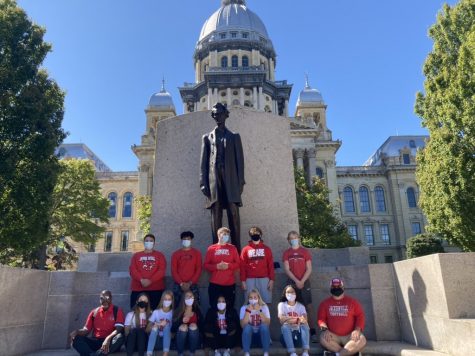Defiance is the essence of change
May 24, 2022
From the first brick at Stonewall striking a single police officer and shattering the rigid expectations of America’s nuclear family- change has most always come from defiance, revolt, rebellion- creating a shift in cultural and societal normalities, and sometimes even in government.
This concept can be observed throughout much of history and present day, referenced in the previously mentioned Stonewall riots, the enlightenment period, and even in an individual’s personal experiences.
Stonewall, more specifically the numerous riots that took place at Stonewall, illustrate just how imperative defiance is to change and their interconnected relationship with one another. This riot as well as the people who participated in such present this concept through the nature of this protest, defiance defined, and its movement against common culture.
Through violence change erupted, voices were heard, and policies were enacted not only to move towards basic protections and rights for LGBTQ+ individuals but also to provide the culture of America with more understanding. This evidence conveys this claim through the way in which change was enacted, as well as the change itself, further illustrating and emphasizing the influence of this disobedience, and its results, establishing their woven relationship.
The Enlightenment period of Europe furthers this idea in numerous ways. Through countless philosophers and scientists challenging the ideas of the church, government, and previously accepted theories, this period became known for its resulting “enlightenment.”
Without scientists defying ideas about the solar system, the conscious, and so much more, science would have never progressed as it did, and would most certainly not be as advanced as it is in current times.
The obstruction of normalities created by various groups and decades of traditions presented the world with a plethora of distinct changes, not only to the culture surrounding these ideas and the perception of change, but to the world of science as well. Without this disruption, change would not have presented itself, building upon the notion that change follows disobedience.
Looking inside oneself can also conceptualize this idea. As a child I grew up extremely different. I was flamboyant and effeminate. I danced, wore heels, and did gymnastics. Although this was welcomed with open arms at home within our doors, walking out into the world with sparkling, ruby nail polish was not.
By pushing against societies expectations of people assigned male at birth, denoted to systemic values bolstered over centuries of patriarchal rule, I was able to find myself, create positive change and acceptance in the people surrounding me, and work in my own way towards the liberation of queer and transgender individuals. Without defiance I would not be the person I am currently, I would not be myself.






